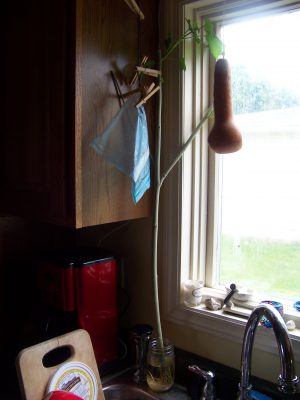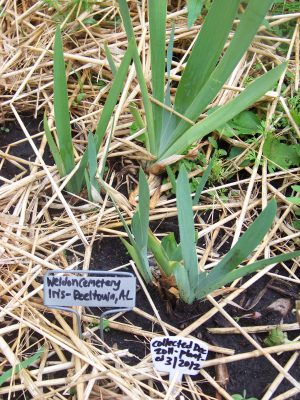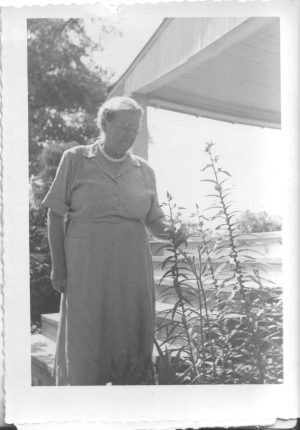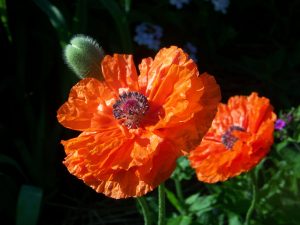
This stem of Hibiscus mutabilis, a.k.a. Confederate rose, flourishes in a Mason jar on my kitchen counter, ready for repotting. Its mother plant, originally a cutting from my parents’ yard in Alabama, is resprouting too. Last summer I planted a cutting like this in my yard to see whether, as the plant encyclopedia promised, it could survive a winter in zone 4. Alas, the plant book seems to have been wrong. That’s why I keep the mother plant in a pot, indoors.
In the South, Confederate rose flourishes as a big woody-stemmed cluster that gets cut to the ground after blooming in October — white flowers that thread with pink along their veins until the entire bloom has blushed dark pink. We’ve cut a mix of pink, white, and pink-and-white for dinner arrangements and watched each blossom shift to the next color on the spectrum by the end of the meal.
This past winter, on a day warm enough for t-shirt and jeans and a fleece vest, I went with my father to clean scrub oak and overgrown crepe myrtle off the graves of my great-grandmother, great-grandfather, great-uncle, and other relatives I’d heard of for years but never knew. Poking out of the grass around the stone were the pale green blades of iris leaves, sprouting prematurely in the heat. I dug up some tubers and packed them home in my suitcase, and now they are growing in my yard, eleven hundred miles north.

For years I held an image of my great-grandmother as a fierce and frightening old woman. Since then I’ve learned she was an FDR liberal and racial progressive who argued with her son about George Wallace and with her husband — a justice of the peace who would marry black couples only outside in his yard, under the big shade tree – about race. If it’s true that the example of our ancestors may “give us permission,” foreshadowing paths in our own lives, it’s fitting, maybe, that she was another Southern liberal. It doesn’t do to idealize anyone, to flatten anyone’s complexity. Among her 5 children were a damaged son she protected, fiercely, and a spirited daughter to whom she clung and with whom she clashed her whole life. I never knew her. But I do know she loved flowers. And those irises around those family stones almost certainly came from her own garden. Now they’re in mine.

What would my great-grandmother say about the passage yesterday of North Carolina’s Amendment One, which defines marriage as between one man and one woman? The last time the state of North Carolina – where I went to graduate school, where I also feel a deep sense of rootedness and home — tried to make marriage-related laws in its constitution was to outlaw interracial marriage. To the 60% of North Carolinians who voted for this: really? Y’all really think the actions of perfect strangers, whipped up into a “problem” by Biblical mistranslations and unexamined prejudices, is the biggest problem you’ve got as a state, or that we have as a country? And that this move isn’t going to hurt an awful lot of “families” besides gay ones?
I think about the long history among Southerners of tolerating the “different,” the “unusual” because “they are like family,” “they are our people.” If you had to look one of those people who are “just like family” in the eye and say to them what votes like this say — I don’t believe you are fully human, like me — you wouldn’t do it. Because it would be mean. And you’d be right. I think about the lesbian friend of mine, a good and generous woman of faith my own age, who burst into tears when describing to me a heterosexual wedding she’d just attended: “I just couldn’t stop thinking,” she sobbed, “I’ll never be able to do that. That’ll never be for me. Why? Why?” And I think about the gay male couple in their seventies who were dinner guests in someone else’s house, with me: let’s call them Bob and Ray. They had been together for more than thirty years. Bob was in a wheelchair, bent double from Parkinson’s disease. Matter-of-factly, Ray cut Bob’s chicken into pieces small enough for him to eat, without choking, carrying on with the table’s general talk (Brahms, end-of-semester-ness, goings-on at church) while keeping one eye on Bob, lifting his fork to his mouth with one shaking but dignified hand.
My heart’s been broken, oh, three or four times by the men who’ve come into my life and out again. I am still dreaming of, still hoping for, a love like what I saw in that moment. The quiet clink of knife across plate, the subtle holding and encompassing within another’s gaze. That care.
And what does the passage of Amendment One make me feel about home, and about my ongoing efforts to live among what I love and do not love about it?
I dream of Alabama. I dream of restoring my grandfather’s orchard, which I’ve written about before. Of walking those pastures as the hum of frogs and the swoop of bats thickens the night. Of picking up rocks, as my grandfather and my father and his brothers did, to keep a bushhog from flinging them as from David’s slingshot into somebody’s forehead. Something like love and grief chokes my throat. I return to that world in fiction, and will do again. I reach and reach. It lingers, it eludes.
And yet I believe the passage of Amendment One is wrong. Division and hatred are wrong. And the unthinking political demagoguery that stirs it into life is wrong.
So much of what we love is always on the verge of being lost, in ways that nauseating cliches about the “Lost Cause” or “family” don’t touch. The land I love is under threat, but not from any red-state political straw man of the day. It’s under threat from the straggled-out remnants of unplanned, uncontrolled development (acres of lots and houses now sitting empty in our 21st century mini-depression), fast-food and big-box chains sprawling around highways and parking lots glittering in the 100+-degree summer heat. It’s under threat from institutional racism that creates evils like this. It’s under threat from drought exacerbated by so many years of everyone pretending human actions have no consequences. We used to get two or three cuttings of hay per year from our fields. Now, we get, if we’re lucky, about half of one. In Texas last summer, farmers took their tractors and balers to interstate medians to try to harvest that grass, out of need.
Those I love and with whom I disagree and I are all mourning something lost, or on the verge of being lost – all trying to save some threatened thing. What’s different is what we call that thing. What kind of names we use.
The modest, the humble, the kind and dignified is under threat by the brash, the arrogant, the shortsighted, the greedy. Was ever thus, maybe. But it feels real to me now, a cause for grief. A grief that reminds me how much I love that land, and always will.
Grief, love, anger, and back again. This is the process in mine and so many others’ written work: come to terms with the South, where the parts that nurture us and the parts that kill lie so close together, like the tangy stems and toxic leaves of the rhubarb in my own yard, right now. Separate out the poison, and be clear what it is. But keep working out for yourself how to hold, honorably, to what is good, and to what is worthy of love. And try to write and speak of it with the compassion and the truth that comes out of that love. Lean forward into it, any amount. There isn’t any other way.

** A small update: The next morning I sat at breakfast in our student union with a colleague, also from Alabama, talking about our similar views on this issue (he’s a religion prof and a former minister.) Right as we were speaking and thinking about love and fear, I looked out over our river valley and saw three bald eagles — my personal touchstones of courage and mystery and forward-going-ness — circling low in the sky. And my copy of Jay Michaelson’s book God vs. Gay?: The Religious Case for Equality, as recommended to me by Mark Oppenheimer’s review, arrived today; opening it, my eyes fell directly on this passage, emphasis mine: “Things are coming to a head in our country. Just as the images of peaceful protestors being shot with water cannons awakened the nation’s conscience fifty years ago, so too the images of gay teenagers killing themselves awaken us today. No, it’s not the same struggle – but it is one struggle. It is the agency of conscience working against the soapstone of fear, which at first appears to be rock solid but soon proves itself amenable to transformation.” (133).
The world, and the heart, are always alive and languaging. Thanks be. Thank You.
Amy,
This is beautiful. It resonates with me in so many ways: from flowers and gardens, Dads and Alabama, agonizing over what I wish I’d said, and what I wish I hadn’t, the grieving and hanging on to things lost or soon to be lost, the exhaustion from that grief, and blessedly, the moments of inspiration that move us out of our sense of helplessness.
I think it was the Dalai Lama who said, “If you think you’re too small to make a difference, try sleeping with a mosquito”. Keep writing, Amy!
Thank you so very much. This means a lot!
Lovely, Amy, in every regard.
“Something like love and grief chokes my throat.” –> such powerful words, and exactly how I feel as read this along with you. You and your writing are so inspiring me!
Thanks so much, y’all. I really, really appreciate you!!!